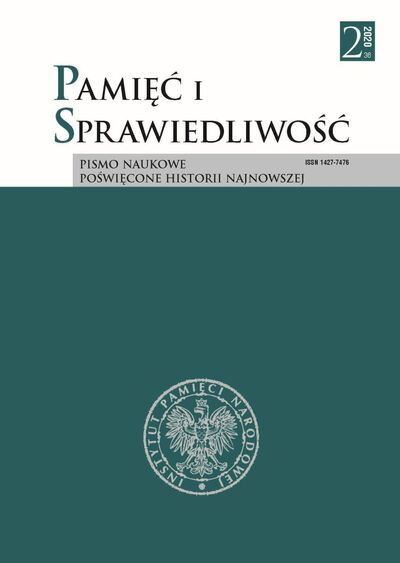Joseph Bühler – an Official Involved in Atrocities or a Deliberate Perpetrator? Reflections on the Trial of Joseph Bühler (17 June – 10 July 1948)
Remembrance and Justice, Vol. 36 No. 2 (2020), pages: 342-365
Publication date: 2020-12-31
 https://doi.org/10.48261/PIS203619
https://doi.org/10.48261/PIS203619
Abstract
The last person to face trial before the Supreme National Tribunal was Josef Bühler, an official of the General Governorate tasked with legislation in German-occupied Poland. The trial was held in Kraków and hinged on the question of whether or not Bühler had become merely unfortunately implicated in a system created by the occupation authorities, which he found impossible to oppose despite his own moral qualms. Was Bühler a weak person, completely dominated by and subservient to Hans Frank, but who nonetheless made attempts to help Poles and to impede the occupation machinery to the best of his ability? Or perhaps this was a misleading image crafted for the purposes of the trial, where the only thing that worked in his favour was the scarcity of evidence pointing to his direct involvement in atrocities? The article examines the trial’s evidence in order to answer those questions. It presents an analysis of the defence put forward by the accused and his legal counsel. It also discusses the arguments of the prosecutors and, above all, the position of the judges. They were faced with the difficult task of using conflicting evidence to establish whether Bühler was only a cog in the occupation machinery, as his legal counsel argued, or perhaps the key architect responsible for creating the legal basis for the apparatus of law enforcement and terror in occupied Poland.
References
Archiwum Instytutu Pamięci Narodowej
Bundesarchiv Berlin, Personalakte Josef Bühler im RJM (Reichsjustizministerium)
Akta Międzynarodowego Trybunału w Norymberdze, t. 12, przesłuchanie z dnia 23.04.1946, s. 64–65, http://avalon.law.yale.edu/imt/04–23-46.asp.
Archiwum Ringelbluma. Konspiracyjne Archiwum Getta Warszawy, t. 6: Generalne Gubernatorstwo. Relacje i dokumenty, oprac. A. Bańkowska, Warszawa 2012.
Protokoll der Besprechung über die Endlösung der Judenfrage, k. 166–180, http://www.ghwk.de/ghwk/deut/protokoll.pdf.
Sawicki J., Przed polskim prokuratorem. Dokumenty i komentarze, Warszawa 1958.
Wolter W., Sprawa odpowiedzialności karnej Josefa Bühlera, byłego sekretarza stanu tzw. Rządu Generalnej Guberni [w:] Ekspertyzy i orzeczenia przed Najwyższym Trybunałem Narodowym, nr 2: Status prawny narodu polskiego w okresie II wojny światowej, Warszawa 1979.
Cooper C.G., Act of State and Sovereign Immunity: A Further Inquiry, „Loyola University Chicago Law Journal”, Winter 1980, t. 11, nr 2.
Cyprian T., Sawicki J., Siedem procesów przed Najwyższym Trybunałem Narodowym, Poznań 1962.
Darcy S., Collective Responsibility and Accountability Under International Law, Leiden 2007 („The Procedural Aspects of International Law Monograph Series”, t. 27).
Drumbl M., The Supreme National Tribunal of Poland and the History of International Criminal Law [w:] Historical Origins of International Criminal Law, red. M. Bergsmo, Cheah Wui Ling, Yi Ping, t. 2, Brussels 2014 („FICHL Publication Series”, nr 21).
Eisenblätter G., Grundlinien der Politik des Reiches gegenüber dem Generalgouvernement 1939–1945, Frankfurt am Main 1969.
Finder G.N., Prusin A.V., Justice Behind the Iron Curtain. Nazis on Trial in Communist Poland, Toronto 2018.
Graf W., Österreichische SS-Generäle. Himmlers verlässliche Vasallen, Klagenfurt–Ljubljana–Wien 2012.
Green J.M., Sprawiedliwość w Dachau. Opowieść o procesach nazistów, tłum. M. Antosiewicz, Warszawa 2012.
Grzebyk P., The Role of the Polish Supreme National Tribunal in the Development of Principles of International Criminal Law [w:] Historical Origins of International Criminal Law, red. M. Bergsmo, Cheah Wui Ling, Yi Ping, t. 2, Brussels 2014 („FICHL Publication Series”, nr 21).
Gumkowski J., Kułakowski T., Zbrodniarze hitlerowscy przed Najwyższym Trybunałem Narodowym, Warszawa 1967.
Haar I., Polityka ludnościowa w Generalnym Gubernatorstwie: polityka narodowościowa wobec Żydów i polityka osadnictwa a inicjatywy regionalne i centralne, „Pamięć i Sprawiedliwość” 2009, nr 1 (14).
Kampe N., Klein P., Die Wannsee-Konferenz am 20. Januar 1942. Dokumente, Forschungsstand, Kontroversen, Köln–Weimar–Wien 2013.
Królikowski M., Odpowiedzialność karna jednostki za sprawstwo zbrodni międzynarodowej, Warszawa 2011.
Kubicki L., Zbrodnie wojenne wobec prawa polskiego, Warszawa 1963.
Loose I., Josef Bühler. Regierung des Generalgouvernements. Ein Hintermann [w:] Teilnehmer. Die Männer der Wannsee-Konferenz, red. H.Ch. Jasch, Ch. Kreutzmüller, Berlin 2017.
Lubecka J., German Crimes Tried in Poland: A political and legal analysis on the example of Supreme National Tribunal Trials in Southern Poland [w:] Political and Transitional Justice in Germany, Poland and Soviet Union from the 1930s to the 1950s, red. J. Zarusky, M. Brechtgen, W. Bułhak, Göttingen 2019.
Lubertowicz M., Lex iniustissima non est lex. Formuła Gustava Radbrucha jako alternatywa dla międzynarodowego systemu ochrony praw człowieka, „Studia Erasmiana Wratislaviensia” 2010, z. 4.
Makarewicz J., Zasady Polskiego kodeksu karnego, „Ruch Prawniczy, Ekonomiczny i Socjologiczny” 1932, nr 12 (2).
Musiał B., Deutsche Zivilverwaltung und Judenverfolgung im Generalgouvernement. Eine Fallstudie zum Distrikt Lublin 1939–1944, Düsseldorf 1999.
Ohlin J.D., Incitement and Conspiracy to Commit Genocide [w:] The UN Genocide Convention. A Commentary, red. P. Gaeta, Oxford 2009.
Radbruch G., Gesetzliches Unrecht und übergesetzliches Recht, „Süddeutsche Juristenzeitung” 1946, nr 5.
Schenk D., Hans Frank. Biografia generalnego gubernatora, tłum. K. Jachimczak, Kraków 2009.
Siewierski M., Wpływ instytucji procesu norymberskiego na postępowanie przed Najwyższym Trybunałem Narodowym [w:] Norymberga – nadal otwarty rozdział historii. W XXX rocznicę wyroku Międzynarodowego Trybunału Wojskowego, Warszawa 1977.
Szondi L., Kain, Gestalten des Bösen, Bern–Stuttgart–Wien 1969.
Zmierczak M., Pozytywizm prawniczy a prawnicy i prawo w Trzeciej Rzeszy – powojenna dyskusja niemieckich historyków i teoretyków prawa o przyczynach upadku prawa w czasach nazizmu, „Studia nad Faszyzmem i Zbrodniami Hitlerowskimi. Acta Universitatis Wratislaviensis” 2001, t. 24.
License
Copyright (c) 2023 Pamięć i Sprawiedliwość

This work is licensed under a Creative Commons Attribution-NonCommercial-NoDerivatives 4.0 International License.
https://creativecommons.org/licenses/by-nc-nd/4.0
Most read articles by the same author(s)
- Joanna Lubecka, Jerzy Sawicki, Supreme National Tribunal (NTN), German war crimes trials, legal history, collaboration , Remembrance and Justice: Vol. 45 No. 1 (2025)
 Język Polski
Język Polski
 English
English
 Deutsch
Deutsch
 Français (France)
Français (France)
 Italiano
Italiano
 Русский
Русский



 PDF (Język Polski)
PDF (Język Polski)




